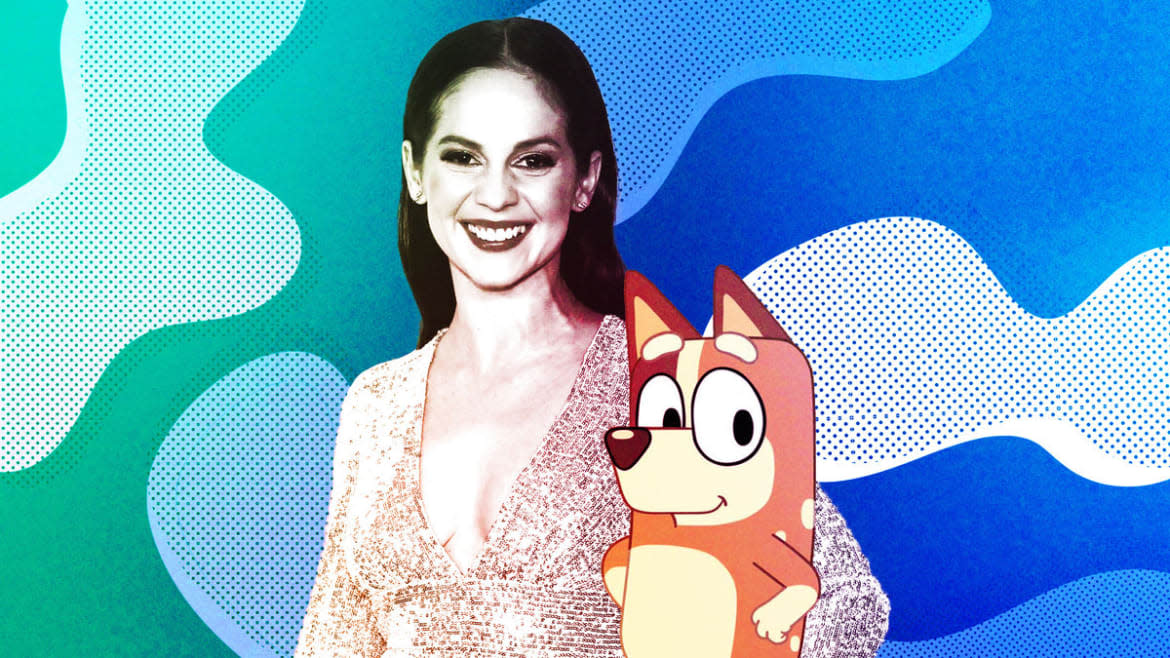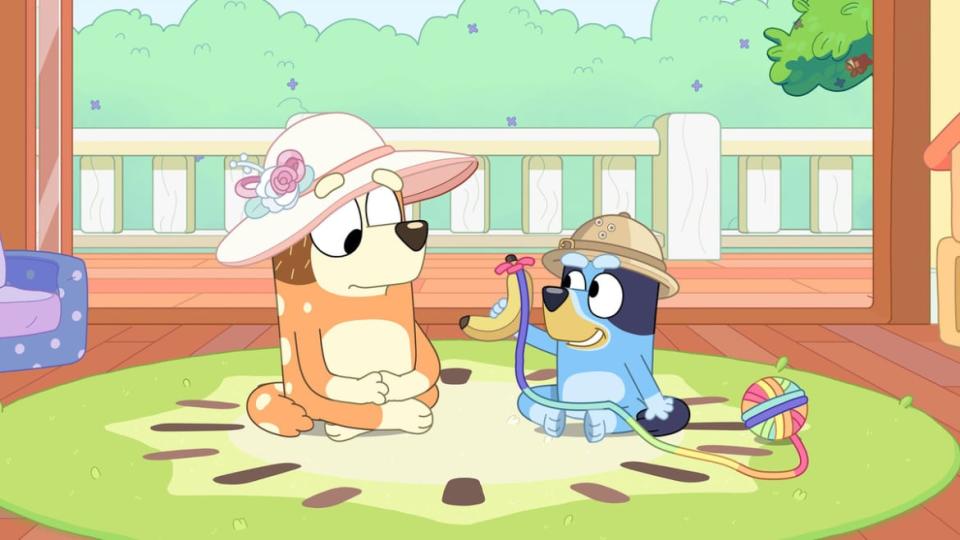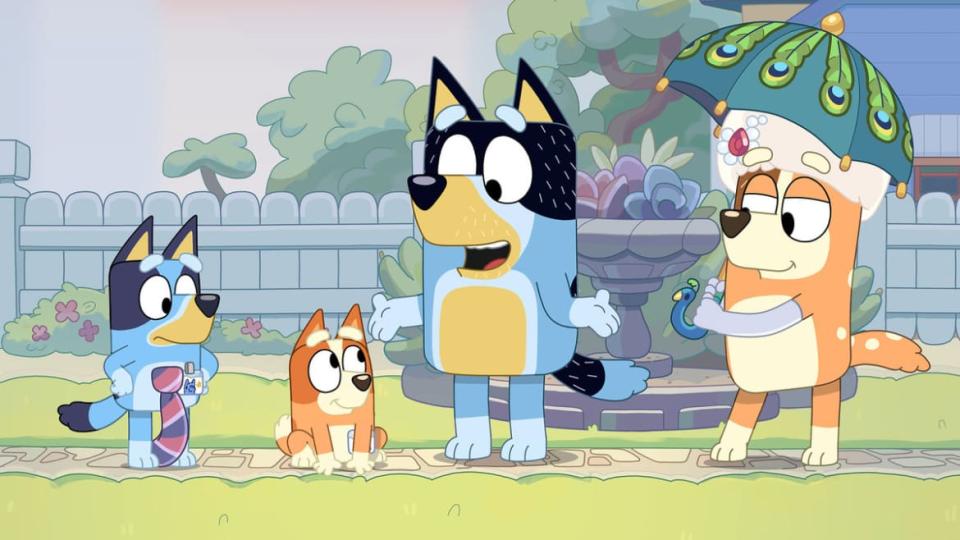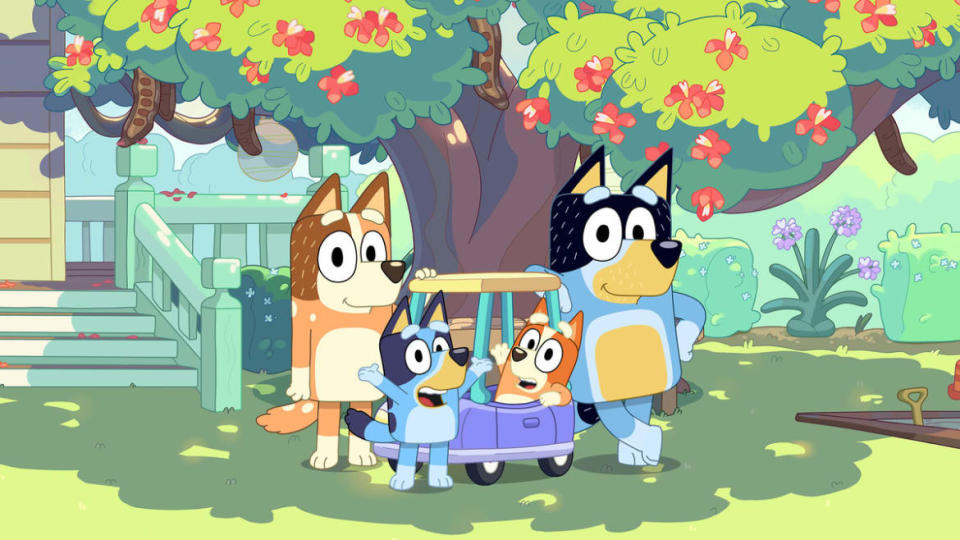How ‘Bluey’ (Really, Truly) Changed Parenting—And the World

It’s nice to play. It’s also hard.
Over the last four years, the Australian animated TV series Bluey has transformed what it means to play: what children might be feeling—or fearing—as they play; how parents and their kids can connect over play; and what parents can learn from escaping their adult realities and leaning into the wonder of imaginative play.
It’s something seemingly basic that ends up being profound—and something so profound is, again, hard. It’s not easy to have the patience. Every family’s relationships are different, and difference breeds insecurity. Bringing play into the real world—and, conversely, the real world into play—is a difficult negotiation, and the blending of the two means swirling the innocence of a child’s imagination with heavy truths of life. Sometimes you’re sad. Sometimes you’re tired. It’s life; sometimes, parent or child, you’re just overwhelmed.
That difficulty, and that joy, has made millions of parents feel seen, as their children remain endlessly entertained. It’s not hyperbole to say that, in real ways both tangible and emotional, Bluey has been changing the world. And now, it’s bigger than ever.

The show centers around the dynamic of a typical, recognizable family living in Australia—a family that just happens to be dogs. There’s Bluey and her sister, Bingo, plus their mum (Chili) and dad (Bandit).
A typical episode centers around Bluey and Bingo as they attempt to make each day an adventure. In the grand tradition of children’s series, there’s often a lesson to be learned. But Bluey gives a 360-degree view of what that day entailed, showing the effort it took for mum and dad to pull off the activities, the fun, and the education. Their desire to throw away their inhibitions and simply have a blast as a family is juggled with their grown-up responsibilities, pangs of inferiority and inadequacy, and the pressure of handling the major moments right.
Season 3 of Bluey premiered in the U.S. in August on Disney+, with episodes like “Perfect,” in which Bluey and Bingo want to make a Father’s Day breakfast for dad, but mess everything up Lucy-at-the-conveyor-belt style—but it’s OK anyway. “Bedroom” spotlights the difficulty of growing up and learning to be an individual when you have a sibling. In “Mini Bluey,” Bingo dresses up as her older sister and she teaches her how to be like her.
(A personal favorite line that captures the very real hilarity of preschool-aged children: “I like to talk a lot. It doesn’t even need to make sense. Sometimes I just make sounds.” Then Bluey just starts honking and screaming gibberish.)
The Best Kids’ Show on TV Finally Returned to Streaming
The show has become a phenomenon. Even adults without children are keenly aware of its power and started watching it themselves, especially after it started popping up on year-end Best TV Shows lists alongside the likes of Succession and Ted Lasso. It won an International Emmy Award in 2019. A recent episode of Abbott Elementary heavily featured Bluey as a learning tool in one of the character’s classrooms. On Thanksgiving Day, a skyscraper-sized Bluey floated down 5th Avenue alongside pop-culture icons like Charlie Brown, Snoopy, and SpongeBob SquarePants at the Macy’s Thanksgiving Day Parade.
More importantly, the show has changed the way that people parent their children—not to mention helped people without their own kids see friends and family members who in a new light.
“I’ve had that said to me so many times,” Melanie Zanetti, the actress who voices Bluey’s mum, Chili, tells The Daily Beast’s Obsessed. “I've had dads tell me that it’s taught them how to play with their kids. Parents tell me that it’s taught them how to interact with each other in ways that are really positive. I had a teacher tell me that they have a child with autism in their class, and it taught him how to play with other kids and changed his life at school.”
Parents are able to watch it and, unlike in any other series—children’s or otherwise—feel validated. “Take all the unseen labor in an episode like ‘Sleepytime,’ which is my favorite episode,” Zanetti says, “and all the stuff that’s never talked about or known outside your close circle. The show is certainly doing some beautiful, important work.”
Zanetti is in New York City to celebrate Bluey’s debut at the Macy’s parade. “That’s when you know you made it, when you have a big balloon in a big parade,” she laughs. (Her American friends have explained to her what a major deal this is.) The night before, she appeared on The Tonight Show With Jimmy Fallon.
I am an uncle. When I’ve visited my nephews, I have kept Bluey streaming even after they had gone down for their naps, simply because the show is so funny and so moving. That’s to say that I’ve long been fascinated with the series’ rise. In a time when there are so many options that it’s hard for anything to break through, it’s astonishing for a simple-seeming Australian cartoon to become a global streaming hit—and to be as beloved by adults as it is by kids.
Zanetti would be the perfect person to break it all down. Here’s our chat about the hottest TV show in the world: Bluey.
Watching this show has really opened my eyes to both the labor and the fun that my family and friends experience while they’re raising their kids.
Absolutely. There's an episode called “Baby Race,” where Chili’s talking about when Bluey was little and she was in a mother’s group. Everyone's trying to reach milestones at certain times and there’s a lot of competition. She feels like she’s failing. Then this other mother comes up to her and says, “You know, you’re doing a really good job.” I had all my friends with kids sending me crying emojis going, “I feel so seen!” Because it’s hard!
What was going on in your life when this show came around?
I was putting voiceovers down in a studio with Dan Brumm, the brother of the show’s creator, Joe Brumm. He told me that Joe was making this series and it was already cast, but asked if I wanted to make some demos. At the 11th hour, they decided they wanted to change up some voices and asked if they could put my demos in the pilot. I was like, absolutely. I'd seen the very basic animatics. I’d already fallen in love with it. I was like, this is the cutest show I’ve ever seen.

Were you automatically cast for the show, or just the pilot?
They did their due diligence. It was like three months of auditioning people. It was ages. And then they came back to me and they're like, ‘You're perfect.” A couple of years later, one of the producers told me there was a line where they could not get the same warmth from anyone else. And Joe, the creator said, “You did this line, it hit me right where I was supposed to hit me.”
What line was it?
I don’t know! But at that time, I was having a year where I had been on hold for at least six months, down to the final two, on a number of projects. They could have been life-changing, big projects, and I didn’t get any of them. And because I was on hold, I couldn't go and do other things. I was so stressed. I was almost unwell, I was so stressed. And so I decided two things: I started working in voiceovers, and I put my reel together. And that’s why I was at Dan's studio. So if I had not had this period of time of coming in second, of having a year of just getting knocked back, I would never have invested so much time in voiceovers. And I would never have gotten this gig.
What does it mean to you that this is the project that worked out?
It’s great to be part of a project that you feel is bringing good into the world. So many times as an actor, you’re like, “Does anything of this matter?” Like I enjoy it, but it’s not, you know, brain surgery. I’m not going out and doing aid work in the Third World. My sisters, one of them works with the Human Rights Commission and and another one’s in Africa doing soil rehabilitation. One of them worked for intelligence. And I am a cartoon dog.
But you have a major impact on people’s daily lives.
Yeah, it’s getting the feedback from parents. And I have friends who aren’t parents, who are like, “I’m single. I’m 36. I have no kids. I love the show. When I’m sad or when I’m hungover, I watch it and it’s fabulous. And it brings me so much joy.” I just think you don’t know the impact until you start hearing from people how it’s helped them.
What are some of the things that people have mentioned to you specifically?
A lot of mums bring up the episode where Chili says, “I just need 20 minutes.” And then Bluey gets sad and goes, “She doesn't love us any more.” Chili then has to explain that, no, she does, but sometimes when you’re an adult, you just need a bit of time by yourself. Parents have said to me, “This is so useful, because I can go ‘You know In Bluey…’” And the kid is like, “Oh yeah…”
It’s an easy reference point.
The other one that parents have said is “Tactical Wee,” where they make them go to the bathroom before they go anywhere. I think it’s going to be interesting as well. I feel like, because we have so many streaming sites and so much more media is being made, there are very few things that really come through these days. As this generation grows up, I feel like this will be one of the things that has cut through. That’s incredible in this day and age—for anything, really.
How ‘Marcel the Shell With Shoes On’ Saved Jenny Slate
I know a lot of people harp on the idea that this is a show that adults enjoy as much as kids do. What is the secret, do you think, to marrying the entertainment interests of children, who still need to be entertained, and making something that really resonates with adults, too?
It’s just excellent writing. There’s episodes like “Flat Pack,” where, on the surface, what kids would understand is mum and dad are building this IKEA swing. At the same time, the kids are playing these games, and what we’re watching them do is evolution. They start by playing as worms, and then they’re fish, and they’re frogs, until they become humans. And then—I am tearing up just thinking about it. This episode does it to me. [They also pretend to get older, with Bluey as the mum and Bingo as the kid, until Bluey is old and Bingo is ready to be on her own.] Bluey says, “OK, you're gonna go off now.” And then is old and alone and says, “Well, what am I going to do?”
Mum and dad are up in the swing, and they’re like, “Come up here.” Dad says, “Ahh, this is heaven.” I’m like [gasps emotionally]. We’ve watched evolution. We’ve watched looking at death. All of these really quite high concept stuff. But also, it’s just kids having this awesome time and parents bickering about trying to put together an IKEA swing. To have that level of insight is quite profound.

I think that’s the appeal even for those of us who don’t have kids. Or who do, and keep the show on even after the kids go to bed or are down for their naps.
Do you know how many parents tell me that? Pretty much every parent who’s talked to me about it, said, “Oh yeah we keep watching. Like, ‘Just a couple more episodes after they’ve gone to bed.’” Lacey Chabert came up to me last night when I met her [at The Tonight Show]. She was almost in tears. She was like, “I love Bluey so much.” She said when she was away from her kids filming, she would put Bluey on and watch it by herself because she loved it so much and it made her feel closer to her kids.
I feel like if I was on a show like Bluey, I would either have my house wallpapered in Bluey merchandise, or would pretend it doesn’t exist outside of work. Where do you fall on that spectrum?
I don’t have anything. I have a poster in a package that one day might go somewhere. My nieces get my merch. They’re hooked up.
Get the Daily Beast's biggest scoops and scandals delivered right to your inbox. Sign up now.
Stay informed and gain unlimited access to the Daily Beast's unmatched reporting. Subscribe now.

